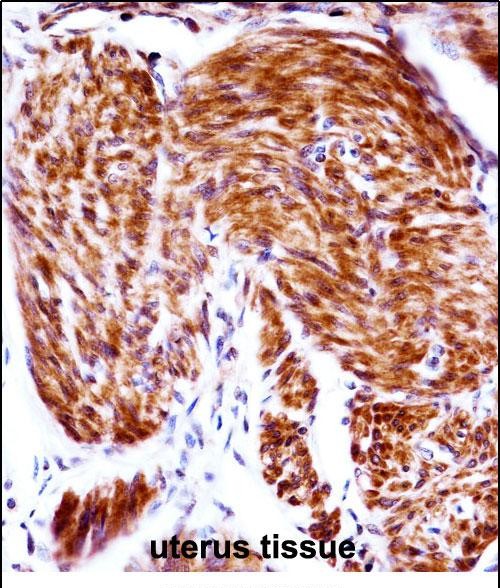PAEP Antibody (Center)
Affinity Purified Rabbit Polyclonal Antibody (Pab)
- 产品详情
- 文献引用 : 1
- 实验流程
- 背景知识
Application
| WB, IHC-P, E |
|---|---|
| Primary Accession | P09466 |
| Other Accession | NP_001018059.1, NP_002562.2 |
| Reactivity | Human |
| Host | Rabbit |
| Clonality | Polyclonal |
| Isotype | Rabbit IgG |
| Calculated MW | 20624 Da |
| Antigen Region | 73-101 aa |
| Gene ID | 5047 |
|---|---|
| Other Names | Glycodelin, GD, Placental protein 14, PP14, Pregnancy-associated endometrial alpha-2 globulin, PAEG, PEG, Progestagen-associated endometrial protein, Progesterone-associated endometrial protein, PAEP |
| Target/Specificity | This PAEP antibody is generated from rabbits immunized with a KLH conjugated synthetic peptide between 73-101 amino acids from the Central region of human PAEP. |
| Dilution | WB~~1:1000 IHC-P~~1:100~500 E~~Use at an assay dependent concentration. |
| Format | Purified polyclonal antibody supplied in PBS with 0.09% (W/V) sodium azide. This antibody is purified through a protein A column, followed by peptide affinity purification. |
| Storage | Maintain refrigerated at 2-8°C for up to 2 weeks. For long term storage store at -20°C in small aliquots to prevent freeze-thaw cycles. |
| Precautions | PAEP Antibody (Center) is for research use only and not for use in diagnostic or therapeutic procedures. |
| Name | PAEP |
|---|---|
| Function | Glycoprotein that regulates critical steps during fertilization and also has immunomonomodulatory effects. Four glycoforms, namely glycodelin-S, -A, -F and -C have been identified in reproductive tissues that differ in glycosylation and biological activity. Glycodelin-A has contraceptive and immunosuppressive activities (PubMed:7531163, PubMed:9918684). Glycodelin-C stimulates binding of spermatozoa to the zona pellucida (PubMed:17192260). Glycodelin-F inhibits spermatozoa-zona pellucida binding and significantly suppresses progesterone-induced acrosome reaction of spermatozoa (PubMed:12672671). Glycodelin-S in seminal plasma maintains the uncapacitated state of human spermatozoa (PubMed:15883155). |
| Cellular Location | Secreted |
| Tissue Location | This protein is, the main protein synthesized and secreted in the endometrium from mid-luteal phase of the menstrual cycle and during the first semester of pregnancy (PubMed:3667877) Glycodelin-A is expressed in amniotic fluid, endometrium/decidua and maternal serum (at protein level) (PubMed:3194393). Glycodelin-F is expressed in follicular fluid, luteinized granulosa cells and the oviduct (at protein level) (PubMed:12672671). Glycodelin-S is expressed in seminal plasma and seminal vesicles (at protein level) (PubMed:9239694). Glycodelin-C is detected in cumulus cells (at protein level), but cumulus cells do not synthesize Glycodelin-C but take up and convert glycodelin-A and -F vis glycan remodeling (PubMed:17192260). |
For Research Use Only. Not For Use In Diagnostic Procedures.

Provided below are standard protocols that you may find useful for product applications.
BACKGROUND
This gene is a member of the kernel lipocalin superfamily whose members share relatively low sequence similarity but have highly conserved exon/intron structure and three-dimensional protein folding. Most lipocalins are clustered on the long arm of chromosome 9. The encoded glycoprotein has been previously referred to as pregnancy-associated endometrial alpha-2-globulin, placental protein 14, and glycodelin, but has been officially named progestagen-associated endometrial protein. Three distinct forms, with identical protein backbones but different glycosylation profiles, are found in amniotic fluid, follicular fluid and seminal plasma of the reproductive system. These glycoproteins have distinct and essential roles in regulating a uterine environment suitable for pregnancy and in the timing and occurrence of the appropriate sequence of events in the fertilization process. A number of alternatively spliced transcript variants have been observed at this locus, but the full-length nature of only two, each encoding the same protein, has been determined. [provided by RefSeq].
REFERENCES
Soni, C., et al. Mol. Immunol. 47(15):2458-2466(2010)
Lee, C.L., et al. Fertil. Steril. 94(2):769-771(2010)
Tsviliana, A., et al. Anticancer Res. 30(5):1637-1640(2010)
Scholz, C., et al. Anticancer Res. 30(5):1599-1603(2010)
Amir, M., et al. Reprod. Biol. Endocrinol. 7, 152 (2009) :
终于等到您。ABCEPTA(百远生物)抗体产品。
点击下方“我要评价 ”按钮提交您的反馈信息,您的反馈和评价是我们最宝贵的财富之一,
我们将在1-3个工作日内处理您的反馈信息。
如有疑问,联系:0512-88856768 tech-china@abcepta.com.






















 癌症的基本特征包括细胞增殖、血管生成、迁移、凋亡逃避机制和细胞永生等。找到癌症发生过程中这些通路的关键标记物和对应的抗体用于检测至关重要。
癌症的基本特征包括细胞增殖、血管生成、迁移、凋亡逃避机制和细胞永生等。找到癌症发生过程中这些通路的关键标记物和对应的抗体用于检测至关重要。 为您推荐一个泛素化位点预测神器——泛素化分析工具,可以为您的蛋白的泛素化位点作出预测和评分。
为您推荐一个泛素化位点预测神器——泛素化分析工具,可以为您的蛋白的泛素化位点作出预测和评分。 细胞自噬受体图形绘图工具为你的蛋白的细胞受体结合位点作出预测和评分,识别结合到自噬通路中的蛋白是非常重要的,便于让我们理解自噬在正常生理、病理过程中的作用,如发育、细胞分化、神经退化性疾病、压力条件下、感染和癌症。
细胞自噬受体图形绘图工具为你的蛋白的细胞受体结合位点作出预测和评分,识别结合到自噬通路中的蛋白是非常重要的,便于让我们理解自噬在正常生理、病理过程中的作用,如发育、细胞分化、神经退化性疾病、压力条件下、感染和癌症。







